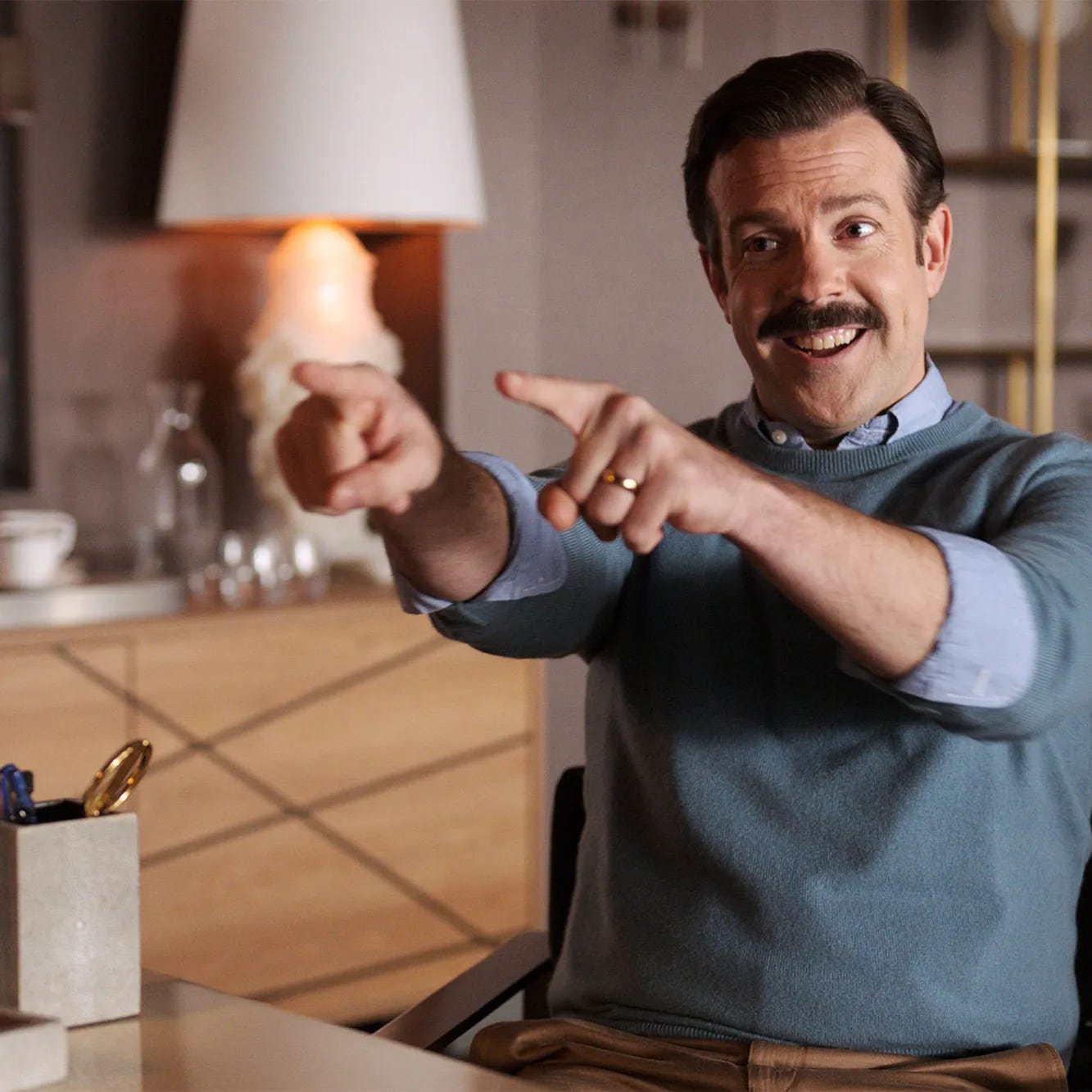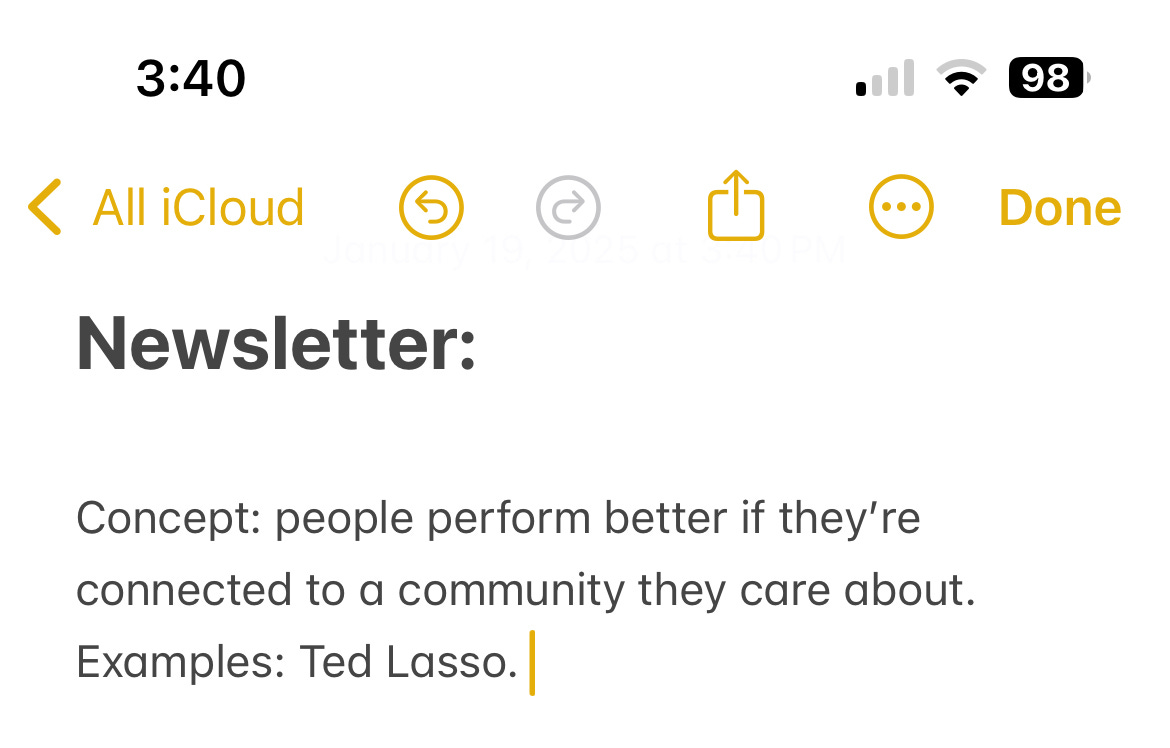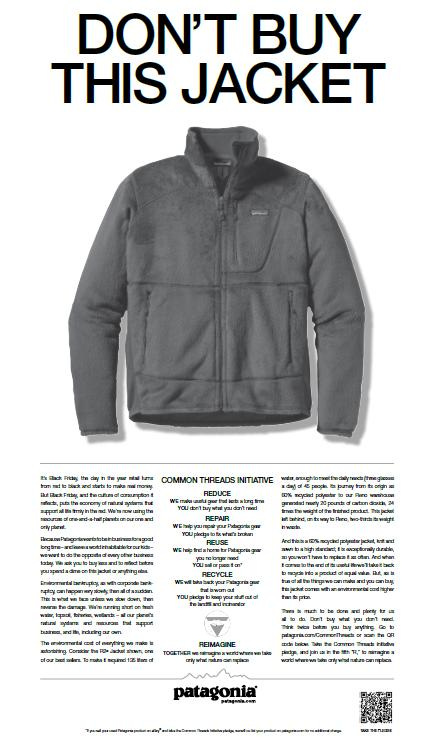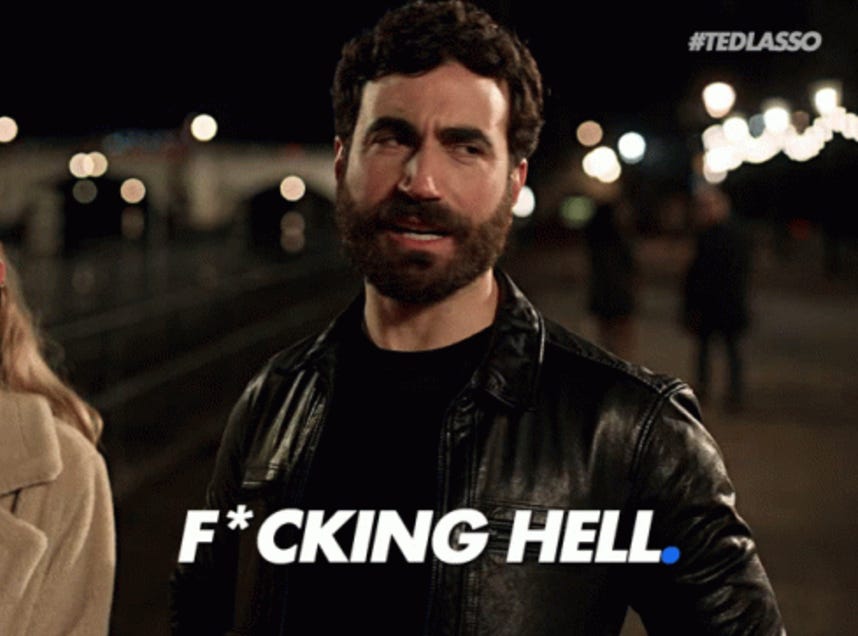4 Powerful Marketing Lessons from Ted Lasso
On the power of going first, building trust, embodying your beliefs, and playing the long game in your marketing.
Today’s newsletter will cover:
The 4 marketing principles to learn from Ted Lasso
Ideas for how to apply these concepts to your heart-forward business
A brilliant campaign from Patagonia circa 2013
How I use mind games to spark confidence in teenagers in the choir rehearsal room (and why this matters for your business)
Some favourite Ted Lasso scenes for your viewing pleasure
You know those friends who are always up to date on the latest shows? The ones you text for a recommendation when you need a new binge?
I’m not that friend.
On the opposite end of the spectrum, I’m the chronically behind friend. I'm basically living under a rock and get horrified looks of shock when I confess that I have never seen an episode of Grey’s Anatomy or The Bachelor.
Thankfully, my mother, with her many different streaming subscriptions and excellent taste, keeps me updated on what I should watch. Her recent recommendation was Ted Lasso. We watched season one together in November when I was visiting her.
While I relished in our nightly Ted and popcorn binges that week, the show also struck a deeper chord and sparked two reflections:
First, it’s the perfect combination of hilarious and heartwarming, rivalling some of my other faves like The Office, New Girl, and Parks & Recreation.
Second, season one is a brilliant masterclass for building a brand that your audience actually cares about. I immediately filed it away as a future post idea.
🪨 Ted Lasso: A Summary (for Fellow Rock Dwellers)
Here’s a brief overview of the show. This will not do it justice, but it’s important to have some context:
Ted Lasso is an American football coach who gets hired to coach a struggling English professional soccer team called AFC Richmond – even though he has zero experience with the sport.
The twist? Rebecca, the owner, secretly hopes that he will fail and drive the team to the ground. She hired him only as revenge against her cheating ex-husband, whose deepest love is AFC Richmond.
Ted brings relentless optimism, unconventional strategies, and occasionally annoyingly folksy charm in his approach to trying to win over the cynical players (and skeptical fans), which he slowly does.
AFC Richmond struggles throughout the season, facing losses, injuries, and internal conflicts. However, Ted's unconventional coaching methods and focus on teamwork and personal growth start to have a positive impact on the players.
The important theme to take away: Season one of Ted Lasso is all about the power of optimism, kindness, and believing in yourself and others.
📝 Marketing Masterclass Moments From Ted
In the show, Ted’s critics would say he’s too soft. He's all about feelings instead of results, with too much focus on connection and not enough actual strategy.
But I’d argue that his heart-led approach is incredibly strategic. In the rest of this post, I’ll explore the four marketing principles Ted Lasso teaches us about building businesses people care about.
✨ Principle #1: Embody Your Beliefs
Embodiment is a buzzword that gets tossed around a lot in the online space, but all it means is that you actually do the things that you talk about helping your people with.
You don’t just talk the talk; you walk the walk.
Ted Lasso's coaching philosophy is that fostering empathy, trust, and connection in the players will ultimately lead to success both on and off the field. And he certainly embodies this. He doesn’t just help his players to care more about one another, he leads every interaction with others with kindness.
My favourite example of how Ted embodies his beliefs happens in the ‘biscuits with the boss’ scenes.
Remember Rebecca? Ted’s boss who hired him in hopes that he will fail miserably?
Ted starts each day baking shortbread cookies for Rebecca and insisting she eat them while chatting with him, despite her coldness and hostility. His small, persistent act of kindness eventually chips away at her defenses and eventually opens the door for a genuine connection.
Patagonia: a real-life example of embodiment
Patagonia cares about the environment and social responsibility, so it encourages consumers to repair their clothing instead of throwing it away.
In 2013, they launched a ‘Don’t Buy This Jacket’ ad campaign in support of their Common Threads Initiative, the slogan of which is "Great For A Good Time and A Long Time." The campaign encouraged consumers to think twice before buying something they already had, discouraged mindless consumerism, and promoted sustainable shopping choices.
Not only did this disruptive campaign deeply with Patagonia’s ideal clients – outdoor adventurers who care about the environment – it also strengthened their positioning and promise of longevity and an excellent quality of product.
How to powerfully apply ‘Embody Your Beliefs’ your marketing:
Know what you value.
Talk about these beliefs.
Go a step further – and show how you embody them. How do these beliefs actually show up in your services? In the work you do with your clients? In your life and business as a leader?
One of my core brand beliefs is the importance of trusting your intuition. In my messaging, I often say, ‘First you learn the rules, then you make them your own.’
Here’s how my marketing embodies this core belief:
By creating content that shows how I take tried and true strategies and make them work intuitively for me.
By talking about offers that support clients in learning said strategies and giving them personalized coaching to help them tune into their inner wisdom and adapt the frameworks to work for them.
🥇 Principle #2: Someone Has to Go First
For much of season one, Ted struggles to build rapport with the AFC Richmond players. They balk at his team-building efforts, are frustrated with his lack of football knowledge, and are baffled as to why he cares so much about them as humans.
The turning point happens when Ted’s optimistic approach eventually wins the trust of the team captain, Roy Kent, perhaps the most cynical of all the players.
The impact of Roy’s buy-in to Ted’s philosophy is a pivotal moment for the show. When the respected team captain becomes a champion for Ted’s unconventional coaching approach, the rest of the players get on board.
All it takes is one domino to tumble before the rest fall in line. Roy had to go first, and then everyone else followed.
My Auditioning For Solos Example:
I often illustrate the importance of going first with an anecdote from the choir rehearsal room. When I hold solo auditions, I have the kids sing in front of one another rather than alone with me in a separate room.
(The reason for this is because they need to be comfortable confidently singing for their peers to perform for a much larger audience in a concert.)
When I ask for volunteers to try a solo, I’m almost always met with crickets at first.
The kids glance around the room with shifty eyes, waiting to see who will raise their hand.
At this point, I often call on one of the singers and ask them to go first. I always pick someone who a) I know can handle being put on the spot and b) is respected and positively influences the other kids.
This causes a snowball effect every single time. The influential kid goes first, and then suddenly, 14 more hands are in the air, asking to try the solo next time.
All it takes is one confident leader to go first.
How to effectively use ‘Someone Has to Go First’ in your marketing:
Do an honest check-in: are you going first and leading your audience powerfully by example? (See above about Embodying Your Beliefs)
Leverage the domino effect by creating opportunities for dream clients to ‘go first’ by sharing the incredible value they received from working with you.
Referral incentives
Client spotlights in your stories, email, grid posts, blogs
Case studies
Video testimonials
💛 Principle #3: Connection Drives Results
When Ted was hired to coach AFC Richmond, the team had been struggling and had been in last place in their league for years. Sure, the players wanted to win, but desiring that outcome wasn’t enough to motivate them to make the necessary changes to start winning.
What did get them to start winning?
Caring about one another. Cheesy as it sounds, they started playing as a team when the players became invested in each other as humans. And, when they started playing as a team instead of a bunch of selfish individuals, they scored more goals.
Busting the "Friend-Zone" Myth:
A common worry clients come to me with is being stuck in the “friend zone.”
They look at their email list or followers watching their Instagram stories and lament that their audience is too small. They worry that these people aren’t warm leads, they’re friends. They think they shouldn’t even bother talking about their offers because there’s no way that a ‘friend’ would buy from them.
I always respond: “Do you know how many “friends” have become my clients?”
(Countless)
Here’s the fact: for personal brands, personal connection is everything.
In your industry, there are probably tens, hundreds, or thousands of other people who do exactly what you do. Your ideal client could get their problem solved by countless different people.
They’re much more likely to remember you, to reach out to you, and choose you when they feel care about you as a human.
As the one and only Maya Angelou said about the power of connection:
“People will forget what you said, people will forget what you did, but people will never forget how you made them feel.”
How to focus on ‘Connection Drives Results’ in your marketing:
Be a human and pour energy into the ‘like’ of Know, Like, and Trust
Use more personal storytelling in your content
🏃 Principle #4: Just Keep Going
There’s a great scene where Ted and his assistant coach sit in the local pub, drinking pints and opening notes from the team’s anonymous suggestion box.
Ted opens each suggestion one by one, reading each one aloud:
“Wanker.”
“You’re a wanker.”
“Another wanker.”
“Piss off, wanker.”
When he finally learns what “wanker” means, Ted isn’t fazed.
He remains cool as a cucumber, even later on when the entire crowd at the first football match breaks into unison chants of ‘wanker’ when he walks onto the pitch.
Ted is steadfast in his approach. In the face of all (insult-filled) adversity, he keeps moving forward with his coaching style because he knows it will work in the long run.
How to ‘Just Keep Going’ in your marketing:
Play the long game. Understand what drives results for you and do more of that.
Instead of looking for instant gratification by hopping on trends or abandoning perfectly good strategies because they don’t bring an ROI immediately, stay the course with what works for you.
Equally important is self-awareness to seek support when needed, tweak your approach and pivot when necessary, and learn from your mistakes.
🎬 Your Action Steps
Watch Ted Lasso
Reflect on where you can lead with more heart in your marketing – just like Ted. Use the suggestions throughout this email as prompts for implementation.
Cheers, xo
Samara
🦋 P.S.
The doors for the January cohort of The Expansion Collective close on Wednesday.
This last call to join us inside of the group coaching program for creative business owners who want a feel-good roadmap to sustainable, profitable, impact-driven business growth. Please hit reply or send me a DM to chat about the fit of the program for you! 🦋
🎙️ Fresh on The Lead With Heart Podcast:
🤝 Ways to work together rn
The Expansion Collective: Doors close on Wednesday, January 22nd.
Private Mentorship: Join the waitlist for a Q2 spot
—If you enjoyed this article, please tap the Like button below or drop a comment ♥️ Thank you!









Such a wonderful article, Samara! Ted Lasso is a great example of embodied leadership. I also love his 'Believe' sign as a powerful reflection of his values—it’s such a great reminder that when our messaging aligns with our embodiment, that’s when the magic happens. Thank you for your beautiful insights and for being such a great example of this in how you run your business.